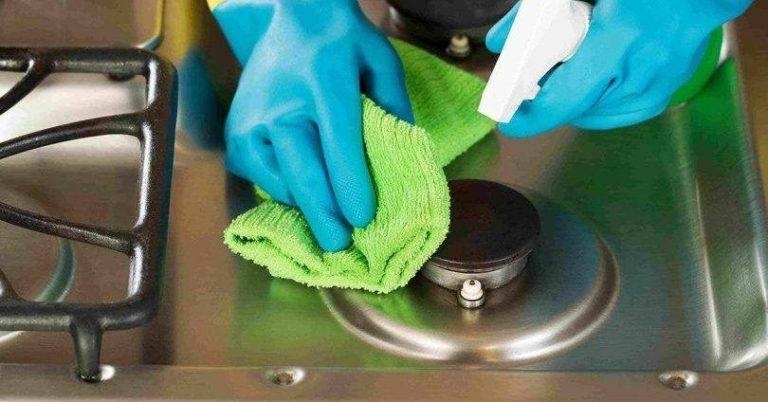ADVERTISEMENT
8. Range Hood Filters
Range hood filters are notorious for trapping grease and food particles. Remove the filter, and soak it in a solution of hot water and white vinegar for 15-20 minutes. Use a brush to scrub away any remaining grease and grime, then rinse with warm water and let it dry before reinserting it.
9. Trash Cans
Trash cans can start to smell unpleasant, especially in the kitchen. To clean and deodorize your trash can, spray it inside with white vinegar and allow it to sit for a few minutes. Wipe away any grime, and rinse with warm water. For extra deodorizing, sprinkle baking soda on the bottom of the can before lining it with a new bag.
10. Faucet and Faucet Handles
Over time, faucets and faucet handles can accumulate mineral deposits, hard water stains, and soap scum. To clean, soak a cloth in white vinegar and wrap it around the faucet or faucet handles. Let it sit for 10-15 minutes, then scrub the area with a sponge to remove stains. Rinse thoroughly for a sparkling shine.
11. Oven Interior
The interior of your oven can get greasy and food-stained. Mix a paste of baking soda and vinegar and apply it to the interior of the oven. Let it sit for 20-30 minutes to break down grease and grime. Wipe away the paste with a damp cloth and watch your oven shine.
12. Coffee Maker
Coffee makers can develop a build-up of mineral deposits and coffee oils that affect both the flavor and function of the machine. To clean your coffee maker, fill the water reservoir with equal parts white vinegar and water, and run a brew cycle. Let the solution sit for 15-20 minutes, then run a few cycles of clean water to rinse the vinegar out of the machine.
13. Coffee Mugs
Over time, coffee mugs can get stained with coffee and tea residue. To remove the stains, soak your mugs in a mixture of vinegar and water for about 15 minutes, then scrub with a sponge or brush. This will help restore their bright appearance and eliminate any lingering odors.
14. Blender
Blenders can be tricky to clean, especially after blending foods like nut butter or smoothies. To clean your blender, fill it halfway with warm water and add a few tablespoons of white vinegar. Turn the blender on and let it run for 30 seconds. Rinse thoroughly, and your blender will be squeaky clean!
15. Toaster Crumbs Tray
Toaster crumbs can build up over time, leading to unpleasant odors and even potential fire hazards. Remove the crumb tray, wipe it down with white vinegar, and let it dry before reinserting. For the main toaster body, use a damp cloth with a little white vinegar to wipe it down, removing any crumbs or grease.
16. Kitchen Tiles
The grout and tiles in your kitchen can accumulate dirt, grease, and soap scum. Mix equal parts white vinegar and water in a spray bottle and use it to spray the tiles and grout. Let it sit for a few minutes, then scrub with a brush to remove the grime. Rinse with warm water to reveal clean, sparkling tiles.
17. Dish Towels and Sponges
Dish towels and sponges are often breeding grounds for bacteria and odors. Soak them in a mixture of white vinegar and water for 15-20 minutes to disinfect and deodorize them. Rinse well and hang them to dry. This will keep them smelling fresh and clean.
18. Cabinet Handles and Knobs
Cabinet handles and knobs can accumulate grime and fingerprints over time. To clean them, soak a cloth in white vinegar and use it to wipe down handles and knobs. This will cut through grease and leave them looking shiny and new.
Conclusion:
White vinegar is truly a kitchen cleaning MVP. It’s safe, effective, and gentle on your surfaces while still getting the job done. From countertops and sinks to appliances and even your trash cans, vinegar helps you maintain a sparkling kitchen with minimal effort. Whether you use it for its deodorizing properties, grease-cutting abilities, or just for a natural clean, white vinegar should definitely have a place in your kitchen cleaning routine.
Next time you find yourself reaching for harsh chemicals, consider using white vinegar instead—it’s affordable, versatile, and environmentally friendly. Plus, it’ll leave your kitchen smelling fresh and clean, without any toxic residue!
ADVERTISEMENT
